Data architects are the backbone of any data-driven organization. They design and manage the frameworks that handle vast amounts of data, ensuring that data is accessible, reliable, and secure.
The role requires a deep understanding of database technology, data modeling, and data integration. Skills such as analytical thinking and strategic planning are also important for success in this field.
Candidates can write these abilities in their resumes, but you can’t verify them without on-the-job Data Architect skill tests.
In this post, we will explore 9 essential Data Architect skills, 11 secondary skills and how to assess them so you can make informed hiring decisions.
Table of contents
9 fundamental Data Architect skills and traits
The best skills for Data Architects include Data Modeling, Database Design, SQL Proficiency, ETL Processes, Data Warehousing, Big Data Technologies, Data Governance, Cloud Platforms and Data Security.
Let’s dive into the details by examining the 9 essential skills of a Data Architect.
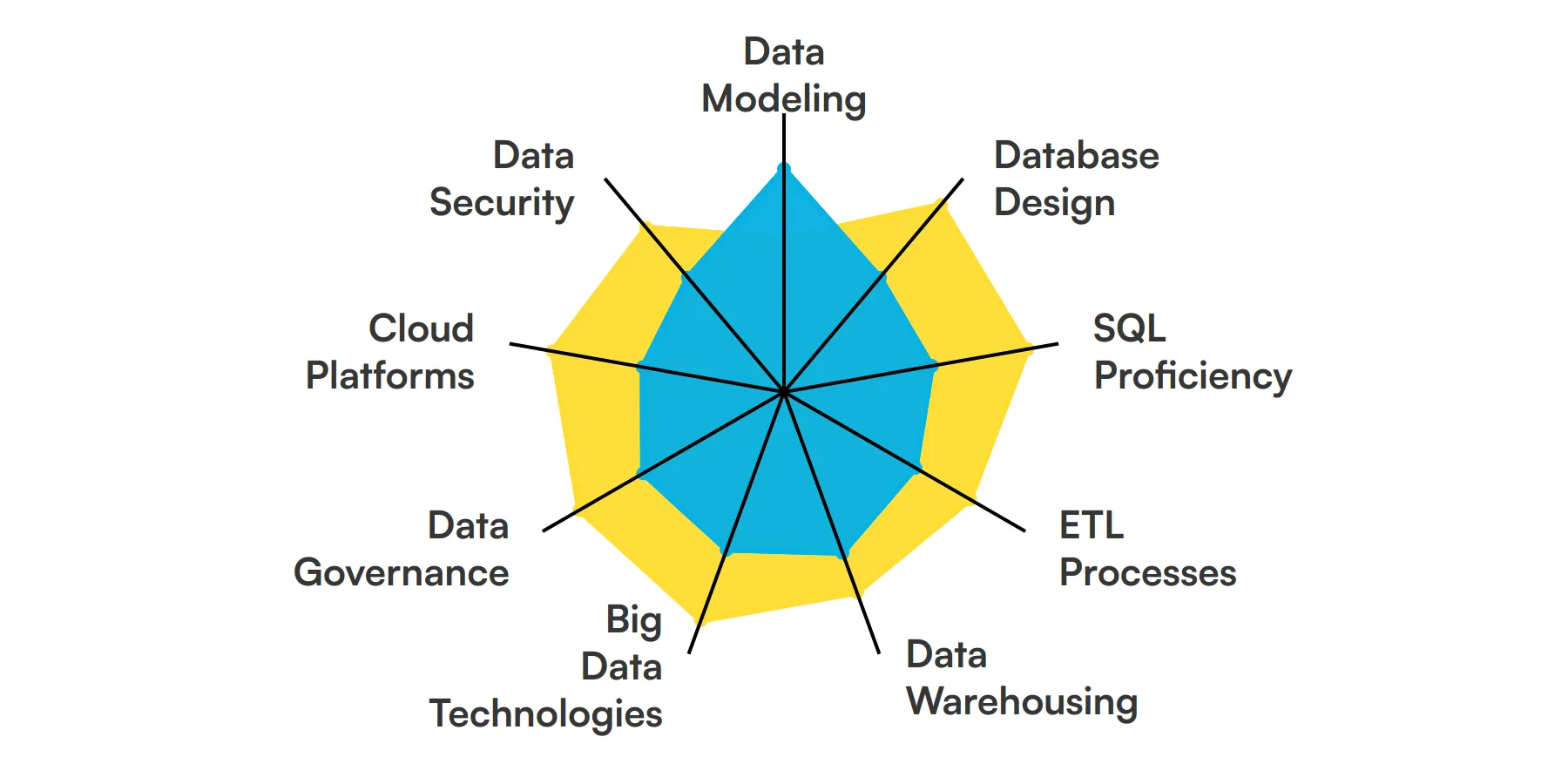
Data Modeling
Data modeling involves designing the structure of a database, including the tables, relationships, and constraints. A data architect uses this skill to create efficient and scalable database schemas that support business requirements and ensure data integrity.
For more insights, check out our guide to writing a Data Modeler Job Description.
Database Design
Database design is about creating the blueprint for how data is stored, accessed, and managed. In this role, you will use this skill to ensure that databases are optimized for performance and can handle large volumes of data without compromising on speed or reliability.
SQL Proficiency
SQL proficiency is essential for querying and manipulating data within relational databases. A data architect needs to write complex queries, optimize them for performance, and ensure that data retrieval processes are efficient and accurate.
Check out our guide for a comprehensive list of interview questions.
ETL Processes
ETL (Extract, Transform, Load) processes are crucial for moving data between systems. As a data architect, you will design and manage ETL workflows to ensure data is accurately and efficiently transferred, transformed, and loaded into target systems.
Data Warehousing
Data warehousing involves creating and managing large repositories of data for analysis and reporting. This skill is used to design data warehouses that support business intelligence activities and provide a single source of truth for decision-making.
For more insights, check out our guide to writing a Data Architect Job Description.
Big Data Technologies
Big data technologies like Hadoop, Spark, and NoSQL databases are essential for handling large-scale data processing. A data architect leverages these technologies to build systems that can process and analyze massive datasets efficiently.
Data Governance
Data governance ensures that data is managed and used properly across the organization. This skill involves setting policies, standards, and procedures to maintain data quality, security, and compliance with regulations.
Cloud Platforms
Cloud platforms like AWS, Azure, and Google Cloud are increasingly used for data storage and processing. A data architect must be proficient in these platforms to design scalable, cost-effective, and secure cloud-based data solutions.
Check out our guide for a comprehensive list of interview questions.
Data Security
Data security involves protecting data from unauthorized access and breaches. In this role, you will implement security measures such as encryption, access controls, and monitoring to safeguard sensitive information.
11 secondary Data Architect skills and traits
The best skills for Data Architects include Programming Languages, Data Visualization, Machine Learning, API Integration, Project Management, Business Acumen, Data Quality Management, Metadata Management, Data Integration, Data Lakes and Data Cataloging.
Let’s dive into the details by examining the 11 secondary skills of a Data Architect.
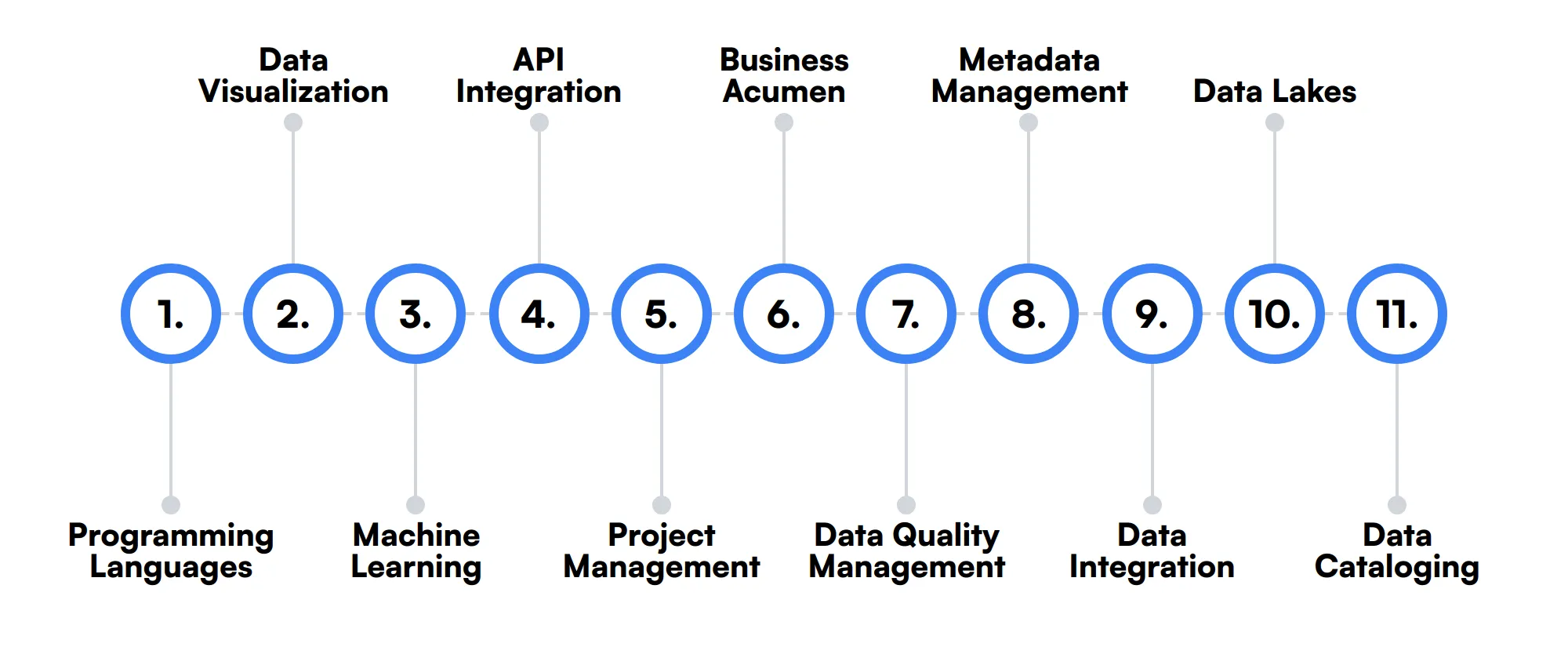
Programming Languages
Knowledge of programming languages like Python, Java, or Scala can be beneficial for scripting, automation, and data processing tasks.
Data Visualization
Data visualization tools like Tableau, Power BI, or D3.js help in creating visual representations of data. This skill is useful for presenting data insights to stakeholders in an understandable format.
Machine Learning
Understanding machine learning concepts and tools can be advantageous for building predictive models and enhancing data analysis capabilities.
API Integration
API integration skills are important for connecting different systems and enabling data flow between them. This is useful for creating seamless data pipelines.
Project Management
Project management skills help in planning, executing, and monitoring data architecture projects. This ensures that projects are completed on time and within budget.
Business Acumen
Understanding the business context and requirements is crucial for designing data solutions that align with organizational goals and drive value.
Data Quality Management
Ensuring data accuracy, consistency, and reliability is key. This skill involves implementing processes and tools to monitor and improve data quality.
Metadata Management
Metadata management involves maintaining information about data, such as its source, usage, and structure. This helps in data discovery and governance.
Data Integration
Data integration skills are essential for combining data from different sources into a unified view. This is important for comprehensive data analysis and reporting.
Data Lakes
Data lakes are storage repositories that hold vast amounts of raw data. Understanding how to design and manage data lakes is useful for handling unstructured and semi-structured data.
Data Cataloging
Data cataloging involves creating an inventory of data assets. This helps in data discovery, governance, and ensuring that data is easily accessible to users.
How to assess Data Architect skills and traits
Assessing the skills and traits of a Data Architect can be a challenging task, given the wide range of technical proficiencies and soft skills required for the role. It's not just about knowing the tools and technologies, but also about understanding how to apply them effectively in real-world scenarios.
While resumes and certifications can provide a snapshot of a candidate's background, they often fall short in revealing the true depth of their expertise. This is where skills-based assessments come into play. By leveraging tools like Adaface assessments, you can gain a clearer picture of a candidate's competencies, leading to a 2x improved quality of hires.
From data modeling and database design to SQL proficiency and cloud platforms, a comprehensive assessment should cover all the key skills a Data Architect needs. This ensures that you are not only evaluating their technical know-how but also their ability to integrate these skills into cohesive data solutions.
Let’s look at how to assess Data Architect skills with these 6 talent assessments.
Data Modeling Skills Test
Our Data Modeling Skills Test evaluates a candidate's knowledge and abilities in database design, SQL, ER diagrams, normalization, relational schema, data integrity, data mapping, data validation, and data transformation.
The test assesses their understanding of data modeling, database design, SQL, ER diagrams, normalization, relational schema, data integrity, data mapping, data validation, and data transformation. Candidates are required to navigate through realistic scenarios involving database design and manipulation.
Successful candidates demonstrate a strong grasp of data modeling concepts, database design principles, and SQL proficiency. They also show the ability to maintain data integrity and perform data transformations effectively.
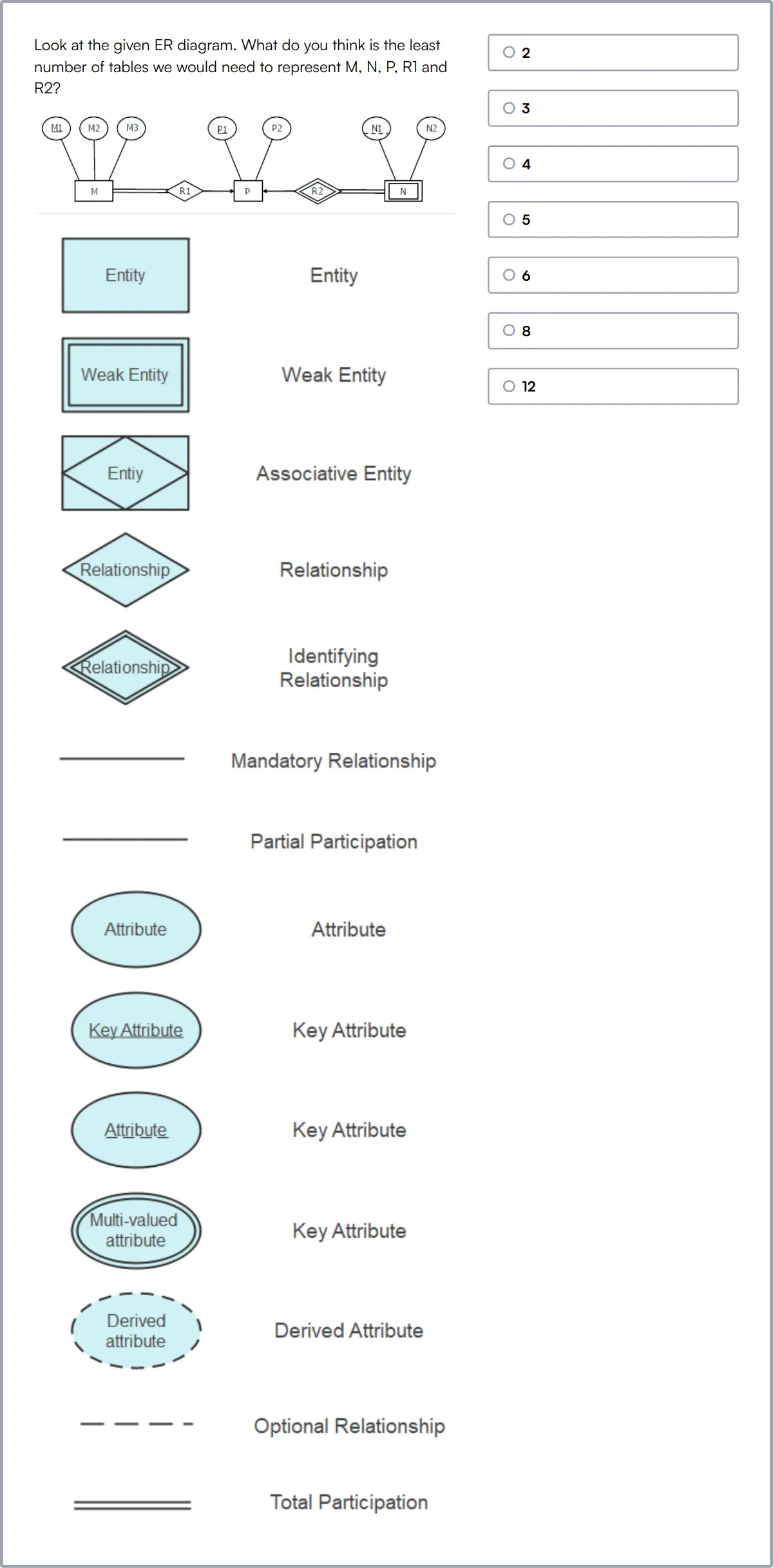
SQL Online Test
Our SQL Online Test evaluates a candidate's ability to design and build relational databases and tables from scratch, apply CRUD options, write queries and subqueries, and create efficient indexes.
The test assesses their understanding of creating databases, creating and deleting tables, CRUD operations, joins and subqueries, conditional expressions and procedures, views, indexes, string functions, mathematical functions, timestamps, locks, transactions, scale, and security.
High-scoring candidates demonstrate proficiency in writing complex SQL queries, managing database transactions, and optimizing database performance through indexing and efficient query design.

Informatica Online Test
Our Informatica Online Test evaluates a candidate's ability to use PowerCenter for ETL tasks, including data synchronization, replication, and transformation.
The test assesses their understanding of data warehousing, ETL processes, data integration, relational database CRUD operations, database joins, mapplets, parameterization, workflows, sessions and tasks, and transformations.
Candidates who perform well demonstrate a strong ability to design and manage ETL processes, execute data transformations, and handle complex data integration tasks without writing SQL.
Data Warehouse Online Test
Our Data Warehouse Online Test evaluates candidates on their expertise in data warehousing, including designing, building, and maintaining data warehouses, databases, and data marts.
The test assesses their understanding of SQL basics, SQL CRUD queries, SQL subqueries and joins, ETL fundamentals, ER diagrams, data modeling, fact tables, normalization, and data warehousing fundamentals.
Successful candidates demonstrate a comprehensive understanding of data warehousing concepts, SQL proficiency, and the ability to design and implement efficient ETL processes.
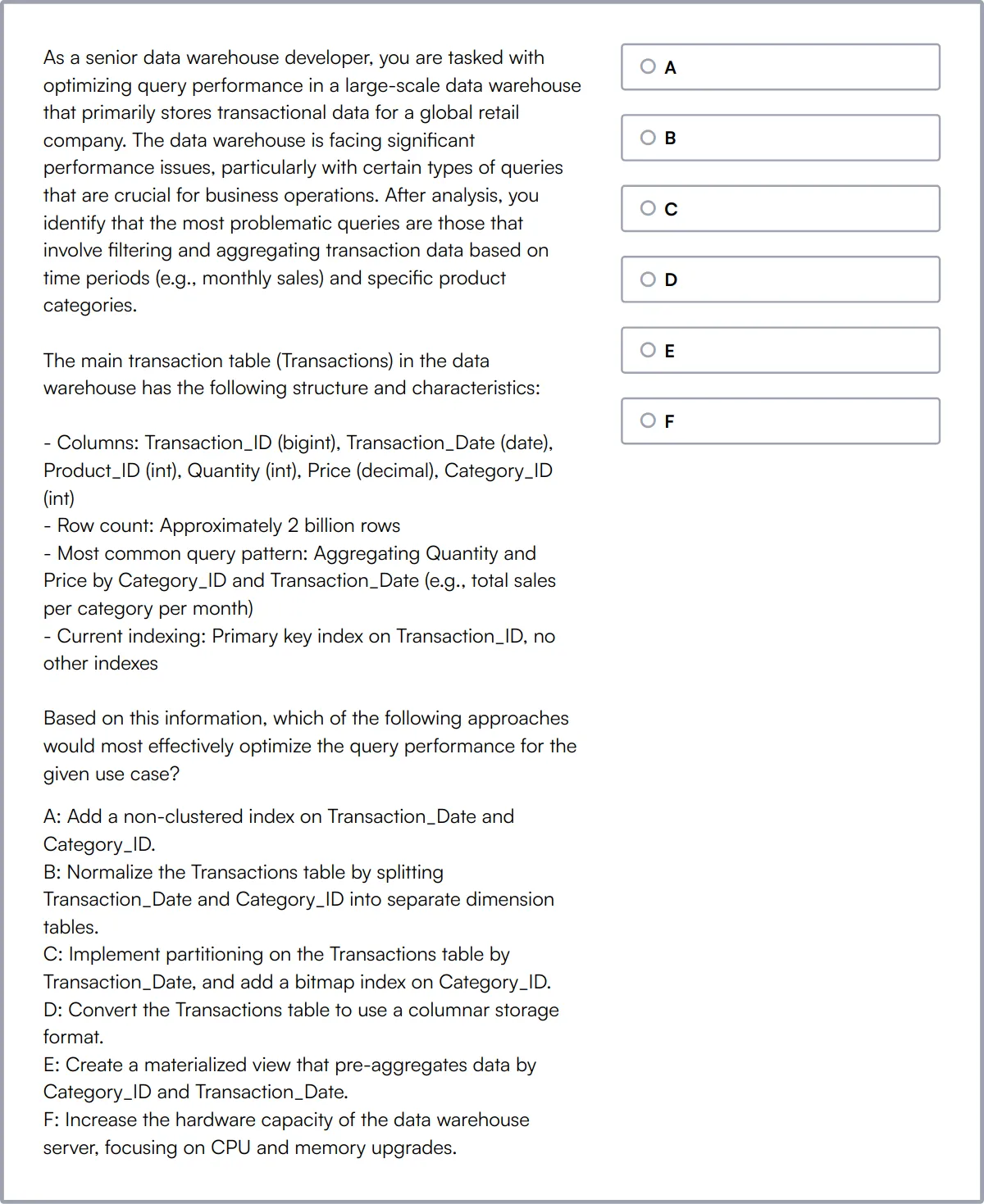
Hadoop Online Test
Our Hadoop Online Test evaluates candidates' ability to install and configure Hadoop clusters, run MapReduce jobs, and write Hive and Pig queries for data analysis.
The test assesses their understanding of Hadoop architecture (HDFS, YARN, MapReduce), Hive and Pig queries, publishing data to clusters, handling streaming data, working with different file formats, and troubleshooting and monitoring.
Candidates who excel in this test demonstrate a strong grasp of the Hadoop ecosystem, the ability to manage and analyze large datasets, and proficiency in writing efficient data processing queries.
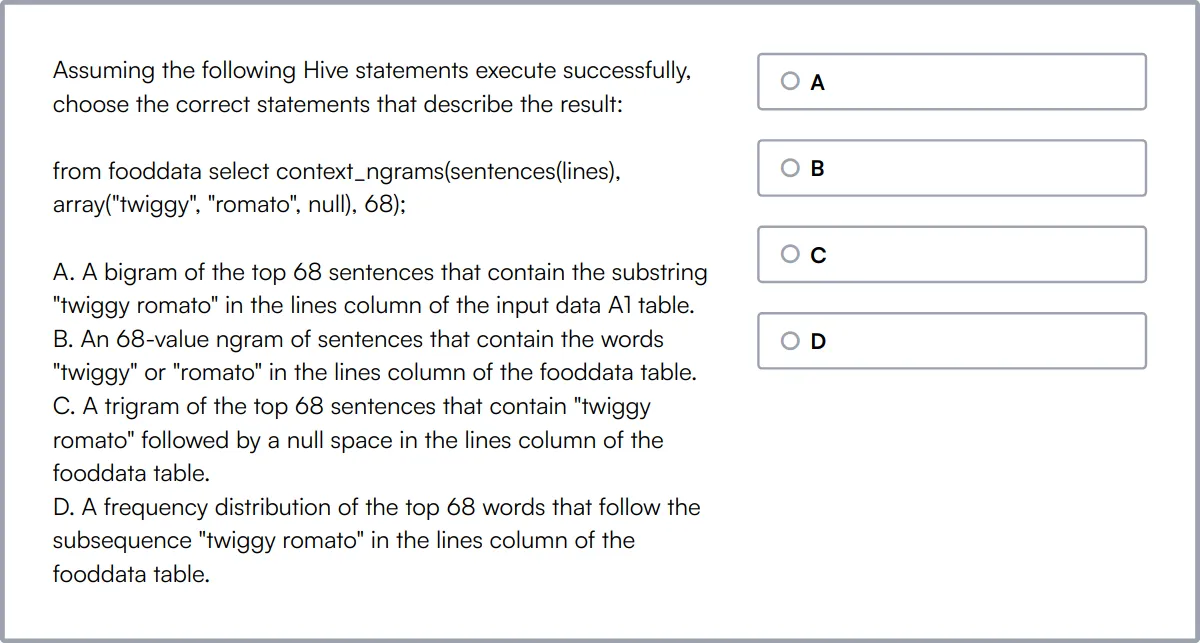
GDPR Online Test
Our GDPR Online Test evaluates candidates on their understanding of GDPR regulations and best practices for data protection and privacy.
The test assesses their understanding of data privacy, data protection, data security, data breach, data processing, consent management, data retention, data subject rights, data transfer, data controllers, and data processors.
High-scoring candidates demonstrate a thorough understanding of GDPR compliance, the ability to identify and mitigate data protection risks, and the skills to develop and implement effective data privacy policies.
Summary: The 9 key Data Architect skills and how to test for them
| Data Architect skill | How to assess them |
|---|---|
| 1. Data Modeling | Evaluate candidate's ability to design and manage complex data schemas. |
| 2. Database Design | Assess understanding of structuring databases for optimal performance and scalability. |
| 3. SQL Proficiency | Test ability to write complex queries and optimize database interactions. |
| 4. ETL Processes | Check proficiency in extracting, transforming, and loading data efficiently. |
| 5. Data Warehousing | Determine knowledge of constructing and managing large-scale data repositories. |
| 6. Big Data Technologies | Gauge expertise in handling and analyzing voluminous data sets. |
| 7. Data Governance | Review understanding of managing data availability, usability, integrity, and security. |
| 8. Cloud Platforms | Assess skills in utilizing cloud services for data management and processing. |
| 9. Data Security | Evaluate awareness and implementation of data protection measures. |
Data Analytics in Azure Online Test
Data Architect skills FAQs
What is data modeling and why is it important for a Data Architect?
Data modeling involves creating visual representations of data systems. It helps in understanding data relationships and structures, which is crucial for designing efficient databases.
How can recruiters assess SQL proficiency in a Data Architect candidate?
Recruiters can assess SQL proficiency through technical interviews, coding tests, and reviewing past projects that involve complex SQL queries and database management.
What are ETL processes and how do they relate to the Data Architect role?
ETL stands for Extract, Transform, Load. These processes are used to move data from various sources into a data warehouse. Data Architects design and optimize these processes.
Why is knowledge of cloud platforms important for Data Architects?
Cloud platforms offer scalable and flexible data storage and processing solutions. Data Architects need to design systems that leverage these platforms for optimal performance and cost-efficiency.
What is data governance and how does it impact a Data Architect's responsibilities?
Data governance involves managing data availability, usability, integrity, and security. Data Architects ensure that data policies and standards are implemented and followed.
How can recruiters evaluate a candidate's experience with big data technologies?
Recruiters can look for experience with tools like Hadoop, Spark, and NoSQL databases. Technical interviews and project reviews can also help assess this skill.
What role does data security play in the responsibilities of a Data Architect?
Data security involves protecting data from unauthorized access and breaches. Data Architects design systems with robust security measures to safeguard sensitive information.
How important is business acumen for a Data Architect?
Business acumen helps Data Architects align data strategies with business goals. It ensures that data solutions support the overall objectives of the organization.
Assess and hire the best Data Architects with Adaface
Assessing and finding the best Data Architect is quick and easy when you use talent assessments. You can check out our product tour, sign up for our free plan to see talent assessments in action or view the demo here:

40 min skill tests.
No trick questions.
Accurate shortlisting.
We make it easy for you to find the best candidates in your pipeline with a 40 min skills test.
Try for freeRelated posts
Free resources



